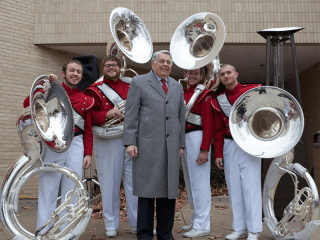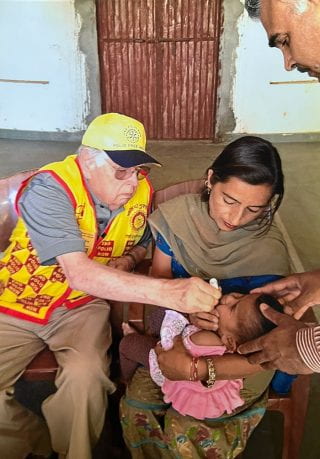Giving in Action: Alumnus Lewis Epley Embodies Service Above Self

Lewis E. Epley Jr., center, became the Voice of the Razorback Marching Band in 1954 and is long-time supporter of the band program.
Service Above Self. The Rotary Club motto is embodied well in Lewis E. Epley Jr., whose formative experiences as a young man continue to lead him in a life of service and philanthropy.
Epley was born in Fort Smith, and soon after, his family moved to Springdale, where his parents worked for the Northwest Arkansas Times. At a young age, Epley would accompany his father, a linotype operator, while he repaired printing machinery for newspaper outlets. His father was one of the best operators in the area and modeled a strong work ethic for his sons.
Epley experienced many defining moments of his life during high school. He enjoyed playing the clarinet and was a member of the Springdale High School Band. One day while playing a set of tennis before his senior year, Epley felt unwell and returned home. His mother had recently read an article about the symptoms and onset of polio and became gravely concerned. Much was unknown about the disease during that time.
Epley was diagnosed with polio and spent the first semester of his senior year at the Arkansas Children’s Convalescent Center in Jacksonville, Arkansas. He was the oldest of 75 patients recovering from polio at the center. His arm and hand were rendered partially paralyzed due to the disease, and he was in physical therapy for rehabilitation. Far from his home, his school, his friends and family, Epley was unengaged with the attempts to improve his arm and leg strength. But it was not long before another person would leave their mark on Epley and help him create a life after polio.
Corinne Wulkan Larson, a physical therapist who had been working with Epley, noted his lack of effort. She told him to become a leader and example for the younger patients — to get with the program or pack his bag and give up his bed for someone willing to do the work. “Larson proceeded to dress me down like a marine drill sergeant would dress down a recruit,” Epley recalled. He slept on her advice, and the next day, committed to therapy. He coached and encouraged younger patients, and discovered discipline and strength in the process. As a result, he was able to return for the second semester of his senior year.
At school, Epley continued to be involved with the band program under the direction of Harry Hinkley and was invited to be the public announcer for a Springdale High School regional marching band contest. He met E.J. Marty in the press box during the competition. Marty was the director of the Razorback Band at the U of A and the judge of the contest. Epley told Hinckley he wanted to be in the Razorback Band but didn’t think he could because the polio paralysis made him unable to play the clarinet. Hinckley called Marty to explain Epley’s situation. Marty said to have Epley come to his office when he registered for classes. At their meeting, Marty made Epley the Voice of the Razorback Band, and he spent seven years as the public address announcer for the band.
Epley started classes at the U of A in the fall of 1954. He earned a degree in public administration from the College of Business, now the Sam M. Walton College of Business, and his LL.B., now recognized as a J.D. (Juris Doctor) from the School of Law in 1971.
In summer, Epley worked at his father’s print shop and at the local swimming pool. In 1959 and 1960, he spent the summers working as a United States Park Ranger at Mount Rushmore National Memorial in South Dakota. Those summers were two of his best and most memorable.
Epley traveled with the Razorback Band to away games and made lifelong friends with many of the band members and directors. The acceptance Epley received from the band motivated him to help the faculty and students improve the band experience at the U of A when he came into positions of success.
During his last year in law school, Epley met Donna Swopes. Following one year of dating, they married and have been together for over 60 years.
Epley received his attorney license from the Supreme Court of Arkansas in 1961 and established a law practice in Eureka Springs. He was admitted to practice before the Federal District Court and the United States Supreme Court in 1974.
In Eureka Springs, Epley became highly involved in the community, serving in many leadership roles. He helped create what is now known as the Carroll-Boone Water District. In 2006, he was recognized for 35 years of service to the district by the naming of the operations building as the Lewis E. Epley Jr. Operating Center.
Epley has a long-standing interest in investing his time and abilities in service to his community. Epley was appointed Special Associate Justice of the Arkansas Supreme Court. He was also appointed by then-Gov. David Pryor as a founding member of the Arkansas State Building Council.

On Rotary International Polio Immunization Day in 2011, Lewis E. Epley Jr. administered the polio vaccine to a child in Chandigarh, India.
He was appointed by then-Gov. Bill Clinton to a 10-year term on the U of A Board of Trustees. During his tenure, Epley was known to be direct and hands-on at a level that few others could match. After retiring from the board, he was named Trustee Emeritus.
Epley advocated for the expansion and improvement of the Razorback Band and the university’s band building. In recognition of his many years of support, the new facility was named the Lewis E. Epley Jr. Band Hall. On three separate occasions, the Epley name was spelled out on the football field by the Razorback Marching Band. This is an honor only ever afforded to one person: Lewis E. Epley Jr.
During his tenure on the Steering Committee, Epley and fellow committee member Julian Stewart led the drive to raise support for the Old Main Clock Fund at the conclusion of the Campaign for the Twenty-First Century. This accomplishment and the conclusion of the campaign were commemorated with a campus and community celebration. During remarks, Epley stated: “Old Main is now complete. After waiting patiently and serving proudly for 130 years, Old Main finally has her tower clock. And she looks beautiful.”
“You cannot properly tell the story of the University of Arkansas without mentioning Lewis Epley,” said Chancellor Charles Robinson. “He has been a valued member of the Razorback family for nearly seven decades, and his contributions as a student, alumnus, trustee and steadfast supporter of all things U of A have helped make us who we are today.”
For more than 50 years, Epley has supported health care in Northwest Arkansas. He and Donna saw a need to enhance facility offerings at the U of A and made a lead naming gift to create a 45,000 square-foot clinic, classroom and laboratory space. The Epley Center for Health Professions houses the Speech and Hearing Clinic and the Eleanor Mann School of Nursing.
During his service on the U of A Medical Sciences Foundation Board and the UAMS Northwest Campus Advisory Board, Epley helped establish a new physical therapy department on the UAMS Northwest campus in Fayetteville. At the department dedication, he was reunited after 60 years with Corinne Wulkan Larson. Her words to her former patient are now inscribed on a wall in the department: “What you lost is not important. What you do with what you have left is important.”
Epley remained steadfast throughout the years in his work to raise awareness and funds for polio treatment and eradication. He participated in Rotary International Polio Immunization Day in 2011, traveling to Chandigarh, India. He has led polio eradication fundraising initiatives with almost every Rotary Club in Northwest Arkansas.
Epley has received numerous awards and accolades in recognition of his dedication and leadership, and served on numerous education, banking, nonprofit and corporate boards. In reflecting on the challenges and accomplishments in his life, Epley stressed the importance to “march on and keep going.”
About University Advancement: University Advancement advances the mission of the University of Arkansas by raising private gift support from alumni, friends, parents, foundations, corporations, and other institutional supporters. Working in philanthropic partnership with academic leaders and volunteers, Advancement team members are determined to advance the people, work, and impact of the greater whole at the University of Arkansas.
About the University of Arkansas: As Arkansas’ flagship institution, the U of A provides an internationally competitive education in more than 200 academic programs. Founded in 1871, the U of A contributes more than $2.2 billion to Arkansas’ economy through the teaching of new knowledge and skills, entrepreneurship and job development, discovery through research and creative activity while also providing training for professional disciplines. The Carnegie Foundation classifies the U of A among the few U.S. colleges and universities with the highest level of research activity. U.S. News & World Report ranks the U of A among the top public universities in the nation. See how the U of A works to build a better world at Arkansas Research and Economic Development News.
This story also appeared in the University of Arkansas News publication.

